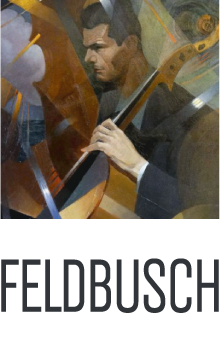Opus 35 n°2 Trois poèmes de Federico Garcia Lorca (1964)
Commentaire introductif du disque Cultura 5067) »
« …. Chacun connaît les magnifiques chants funèbres que Lorca a écrits en mémoire du grand torero dont il était ami :Llanto por Ignacio Sanchez Mejias. E. Feldbusch a choisi un moment essentiel de cette élégie héroïque: «La Sangre derramada (le sang répandu), « La Cogida y Muerte »(l’encornage et la mort),et « Alma ausente »(l’Ame absente).
« Avec une totale modestie devant la beauté du poème, mais aussi avec une intuition intense et sûre pour ce qu’il suggère, Eric Feldbusch a compris la vision de Lorca, développée et prolongée dans un commentaire orchestral avec une sobre beauté, une précision constante et un coloris sombre et mâle, toujours approprié et avec une sobriété stricte qui ne laisse rien de côté de la richesse du style ni de l’intensité dramatique ».
« Cette critique symphonique s’harmonise, au-delà du décor musical, avec le poème et avec la traduction qui en est faite par la récitante (d’ailleurs parfaitement en phase avec la partition) et, en alternance, avec une aversion désespérée (le sang, je ne veux pas le voir) dans le premier mouvement, dans l’incantation obsédante du deuxième (cinq heures du soir) et dans l’élégie pathétique et sobre du final ».
Opus 35 n°2 Trois poèmes de Federico Garcia Lorca (1964)
Inleidende commentaar op de Cultura fonoplaat:
« …. Iedereen kent de prachtige lijkzang die Lorcain 1935 schreef ter nagedachtenis van de grote torero wiens vriend hij was: Llanto por Ignacio Sanchez Mejias. Uit deze heroïsche elegie koos Eric Feldbusch drie essentiële ogenblikken: «La Sangre derremada (het verspreid bloed), «La Cogida y la Muerte » (het Grijpen en de Dood)- in de tuauromachie is het grijpen het ogenblik waarop de stier de torerovat- en «Alma ausente » (afwezige ziel).”
Inleidende commentaar op de fonoplaat Cultura 5067 – 9. “Met een volledige nederheid voor de schoonheid van het gedicht, maar ook met een intense en zekere intuïtie voor de suggestie hiervan, heeft Eric Feldbusch de visie van Lorca begrepen, ontwikkeld en verlengd in een orkestraal commentaar met sobere pracht, met een constante perfectie en een donker en mannelijk koloriet, steeds aangepast en met een strikte soberheid die niets weglaat van de rijkdom der schrijfwijze noch van de dramatische intensiteit.
Dit symfonisch drieluik verenigt zich, boven het muzikale decor uit, met de klanken van het gedicht en met de vertolking van de recitante (trouwens streng op punt gesteld samenmet de partituur), afwisselend in een wanhopige afkeer (« het bloed, ik wil het niet zien »), in de eerste beweging, in de obsederende incantatie van de tweede (« te vijf uur ‘s avonds ») en in de pathetische en sobere eligie van de finale.»
Opus 35 n°2 Trois poèmes de Federico Garcia Lorca (1964)
Introductory commentary to the record Cultura 5067
“… Everyone knows the beautiful funeral dirges that Lorca wrote in memory of his friend the great bullfighter: “Llanto por Ignacio Sanchez Mejias”. E. Feldbusch chose an essential moment within this heroic elegy: “La Sangre Derramada (Spilt Blood), “La Cogida y Muerte”(The Goring and Death”), and “Ausente Alma”(Absent Soul).
“With total modesty in relation to the beauty of the poem, but also with a strong and certain intuition about what it suggests, Eric Feldbusch has understood Lorca’s vision, developed and extended it through an orchestral commentary which has simple beauty, consistent precision and a dark, masculine colour. It is always appropriate and has a strict sobriety that leaves out nothing of the richness of the style or nor of the dramatic intensity.”
“This symphonic commentary is in harmony both with the musical decor, with the poem and with the translation which is made by the narrator (also perfectly in harmony with the score) and alternates with a desperate aversion (blood, I do not want to see it) in the first movement, in the haunting incantation of the second (five o’clock in the afternoon) and in the pathos and sobriety of the final elegy.”
Extraits des “Stances pour Ignacio Sanchez Mejia”
pour récitant et orchestre
Création à Liège récitante Germaine Gerin
Disque: Récitante Germaine Gerin et l’Orchestre de Liège sous la direction de Julien Ghyoros
extrait – uittreksel – extract

